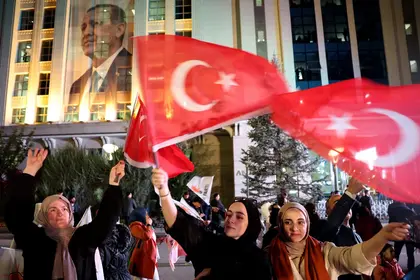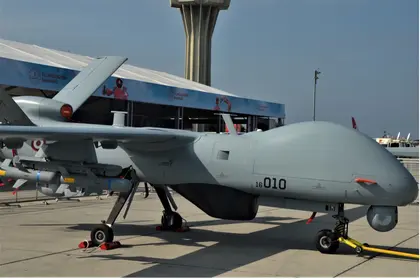The modern state of Turkey emerged from the remnants of the Ottoman Empire to become a powerful strategic nation that acts as a bridge between Europe and Asia.
The mainly Muslim country of 85 million people has been ruled since 2002 by the Islamic-rooted party of President Recep Tayyip Erdogan, the most important leader since Mustafa Kemal Ataturk, the founder of the Turkish republic.
JOIN US ON TELEGRAM
Follow our coverage of the war on the @Kyivpost_official.
Erdogan's two-decade rule was tested in this month's presidential election, but he goes into Sunday's runoff as the firm favourite.
Here are five things to know about Turkey:
- In search of lost glory -
At its peak, the Ottoman Empire ruled a large arc of territory that stretched from the Balkans to modern-day Saudi Arabia and across the Mediterranean to North Africa.
But the empire suffered centuries of decline, culminating in its defeat along with other Central Powers in World War I and its subsequent collapse.
After a war of independence, Turkish military leaders led by Ataturk were able to salvage a state, which became the Republic of Turkey in 1923.
A century later Erdogan is on a drive to rebuild the country's Ottoman-era influence and turn it into a global power.
NATO member Turkey has attempted to straddle the divide between East and West by developing close ties with Russia, which Erdogan has used to try and play peacemaker in Ukraine.
- Secularism debate -
Ataturk, Turkey's first president until his death in 1938, made French-style secularism -- the separation of state and religion -- one of Turkey's founding principles.

Putin and Xi Headline Summit With Anti-Western Stance
Critics accuse Erdogan of chipping away at that principle and turning Turkey away from the West.
The president, who scrapped curbs on wearing the Muslim headscarf and turned the iconic Hagia Sophia museum in Istanbul back into a mosque, says Turks should be allowed to express their religious beliefs openly.
- Scarred by coups -
Turkey's powerful military toppled governments in coups in 1960, 1971 and 1980.
The 1960 coup was followed by the hanging of ousted prime minister Adnan Menderes -- Erdogan's political hero -- along with two ministers.
Erdogan clipped the wings of the military but was himself the target of a July 2016 coup attempt by a renegade army faction.
He blamed the failed putsch on a one-time ally, the US-based preacher Fethullah Gulen, and seized on it to carry out a sweeping crackdown on dissent.
Some 80,000 people were arrested in the judiciary, army, police, media and civil service.
The EU reacted to the crackdown by freezing its already long-stalled talks on Turkey joining the bloc.
- Building boom/bust -
Turkey's economy went from strength to strength in the first years of Erdogan's rule, powered by a building frenzy.
But a spat with the United States and a gradual rise in interest rates across the West caused the Turkish currency, the lira, to crash and inflation to spiral, tipping the country into its worst economic crisis since the 1990s.
The annual inflation rate hit 85 percent in 2022 -- the highest level since 1998.
The country's woes worsened after a devastating earthquake in February 2023, which killed more than 50,000 people in Turkey and flattened entire city neighborhoods.
- The Kurdish question -
Turkey's largest ethnic minority are the non-Arab Kurds, a people scattered across the mountains of Turkey, Iraq, Syria, Iran and Armenia, who have long complained of oppression.
The outlawed Kurdistan Workers' Party (PKK) took up arms in 1984 in an insurgency that has left tens of thousands dead.
Erdogan in the first years of his rule took unprecedented steps towards giving the Kurds greater political and cultural autonomy.
But when a ceasefire unraveled in 2015, the army cracked down hard on Kurdish areas in southeast Turkey and northern Iraq as well as on US-backed Kurdish fighters in Syria.
The leader of the first pro-Kurdish party to hold seats in Turkey's parliament, Selahattin Demirtas, was also thrown in jail.
You can also highlight the text and press Ctrl + Enter






